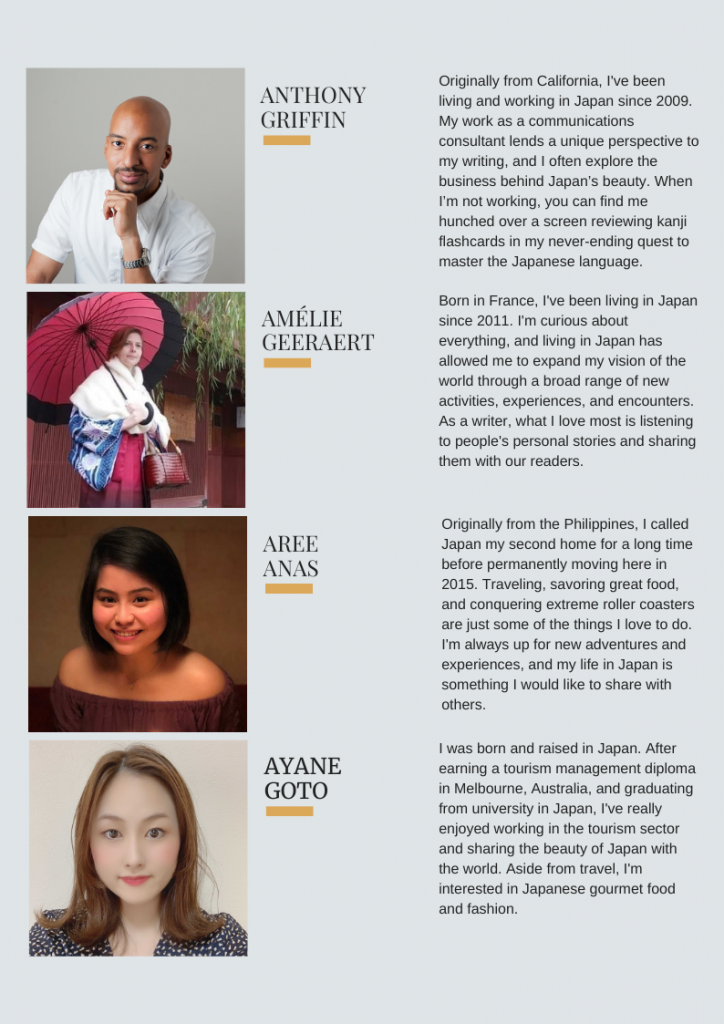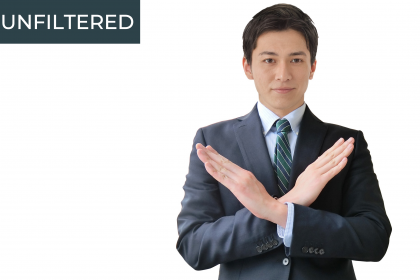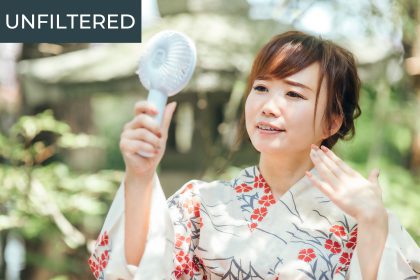The concept of culture is multifaceted and includes the language we speak, the food we eat, the values we share, and even the clothing we wear. If you are planning to interact with a new culture, even temporarily, it’s easy to overlook the role that attire plays in everyday life. How you present yourself in another country can have a significant impact on your experience. In our latest Unfiltered conversation, the Kokoro Media team and I share our experiences with modern Japanese clothing culture and offer some specific advice for those planning to visit or relocate to Japan.
A Revealing Contradiction
Anthony: Let’s talk about clothing in Japan. What’s on your mind, everyone?
Ayane: At my university, there were a lot of English teachers from other countries. The female teachers would often wear more revealing clothes than what I was used to. At that time, I was surprised because Japanese people typically avoid revealing a lot of skin and we often cover our shoulders. So, I could feel a culture difference through clothing.
Amelie: This is one of the reasons I suggested this topic. In Europe, it’s perfectly normal to wear tank tops that show your shoulders, and our tops can be relatively low cut, which is not the case here. In fact, I feel it’s the opposite in Japan. I’m comfortable wearing miniskirts here, but I never felt this way in France because showing your legs is considered a bit sexy. In Japan, it’s perfectly normal to show your legs, as you can see with girls’ high school uniforms. I think it’s funny that the situation is reversed.
Anthony: Ayane, do you have any ideas as to why this is the case?
Ayane: I don’t know. I also think it’s funny. We’re told not to reveal a lot of skin but, at the same time, we often wear skirts that reveal our legs.
What to Wear
Anthony: I guess that will have to remain a mystery for now, but let’s try to give our readers some practical advice. Given what we have said so far, how should people interested in coming to Japan dress?
Amelie: I guess it depends on why you’re coming to Japan. If you’re coming for business, people here will appreciate business attire. But actually, I’d say that you’re able to wear whatever you want. As Ayane mentioned, you may surprise people, but they are never going to say anything to you. However, if you want to blend in, maybe it’s better not to wear tank tops and things like that. Overall, I don’t feel like it’s a big deal.
Aree: I think you can wear whatever you feel comfortable in. Then again, you also have to think about what is acceptable in Japan, so maybe just stay in the safe zone.
Anthony: For example?
Aree: I guess that would mean not wearing overly revealing clothes while not compromising your comfort, personality, and style.
Ayane: As Amelie and Aree said, you can wear whatever you like, but if you want to live or work in Japan, you should follow the rules and dress appropriately.
Amelie: How about you, Anthony?
Anthony: First of all, I have no fashion sense in any country. I don’t know a lot about clothing. However, one thing I like about Japan is the dress code for the professional scene. It’s funny because I’m from California, a super casual place where suits can be a rare sight. Now I’m in Tokyo where suits are everywhere. When I lived in California, my primary set of clothing included casual and business casual attire. Suits were for special occasions. Here, the situation is reversed. My main wardrobe consists of suits, and I just have a minimal amount of casual clothing for the weekends.
I actually like this situation because, with a suit, you don’t have to think about fashion so much. I can just drop into an Aoki suit shop with a helpless look on my face, and the staff will come and help me get a suit in the right color that fits well. So, by relying on suits, I can outsource any decisions I have to make about fashion.
I also find it fascinating that you can wear a suit anywhere here. You can wear a suit at casual restaurants or while grocery shopping. It’s a long story, but I’ve even been on an Okinawan beach in a suit. However, wearing a suit around town in the U.S. generates a lot of unnecessary attention. If I go shopping in a suit, people think I’m the store manager and come up to me asking for assistance.
So that’s the main part of my experience with clothing in Japan. I don’t have any fancy or revealing clothes. So, I don’t have many issues with fashion here. Overall I find that people in Tokyo are way more fashion conscious than a lot of places in the U.S. Even on weekends, many people tend to get all dressed up whenever they step out of their houses. If you’re visiting from abroad, you might be surprised to see this.
One Size Doesn’t Fit All
Amelie: I have another question for you, Anthony. Since you’re quite tall, do you have trouble finding clothing in your size?
Anthony: I know this can be difficult for some people. At about 180 centimeters tall, I can find a good amount of clothes that fit. In fact, once I figured out where to shop, it became easier for me to find clothes that fit me here than in America. I used to buy clothes while vacationing in the U.S. but now it’s easier just to get everything here in Japan. How about all of you?
Aree: When I first came here it was kind of difficult, but like you said, shopping got easier once I knew where to go. However, I’ve noticed that a lot of Japanese boutique brands only carry F [free] size which is said to be one-size-fits-all. However, this isn’t the case. So, you might see something you really like at the store but it only comes in F size. If you don’t fit into that average Japanese size range, then you can’t buy it and wear it.
Some brands have small, medium, and large sizes, but that’s it. In the Philippines, we follow Western sizes so I’m used to having access to a range of sizes from extra small to extra large. So naturally, having a more limited range of sizes in Japan is going to make it difficult for some people to find something that fits. However, this is changing, and recently more and more Japanese brands are offering more sizes. Overall, if you’re coming to Japan, be sure to research the differences in clothing sizes and measurements.
Amelie: I have the same trouble as Aree. I’m 170 cm, which is just a little too tall. When I buy long-sleeve shirts, the sleeves are a little too short for me. I’ve found some places where I can buy clothes that fit me. I also rely on European brands like H&M. It’s too bad, though. Sometimes, I see really cute things in Japanese stores, and I just can’t wear them because they don’t have anything in my size.
Anthony: Ayane, you went the other direction. When you lived in Australia, did you have similar difficulties?
Ayane: Actually, I didn’t have many problems. I’m not so tall, so I could just wear small-size clothing. They were a bit bigger than what I would wear in Japan, but that was OK.
Expression vs. Perception
Amelie: Ayane, in a previous discussion, you mentioned that you need to be more conscious of what you wear in Japan but, in Australia, things were a bit more relaxed. Could you tell us more about this experience?
Ayane: When I was in Australia, I felt like people judged you based on what you say. Here in Japan, I feel like people judge you based on your appearance. So we need to behave politely and wear appropriate clothes. I think that’s the difference between Japan and many other countries.
Amelie: Aree, you’ve taken a fashion course. What are your thoughts?
Aree: When comparing Japan to the Philippines, I feel like people can express themselves more through fashion in Japan. It’s not that we can’t do that in the Philippines, but when you see fashionable people here in Japan, you can just appreciate it. It’s not something you judge them for. However, in the Philippines, if you wear loud clothing or something out of the ordinary, people will look at you. They might appreciate your style but there’s also a feeling of being judged. Here, even though Ayane said that you’re judged by your appearance, people are still able to express themselves more freely through fashion. And a lot of people here are really fashionable.
Anthony: That’s a good point. We have this impression that Japan is strict and that there’s no freedom of self-expression. However, you really can express yourself. People may be judging you in their minds, but no one is going to externalize that by pointing, laughing, or staring. Because of this, even those who have loud or unusual fashion choices can go out in public and get the same levels of customer service that anyone else would get.
Final Thoughts
Anthony: As with any country in the world, it’s a good idea to research and consider cultural norms before coming to Japan. Especially, if you’re just vacationing for a couple of weeks, go ahead and try to fit in. You don’t want to make other people uncomfortable, even if they are not going to express their comfort externally. Anyway, those are my final thoughts. Did I miss anything?
Amelie: No—I think you said it all.





